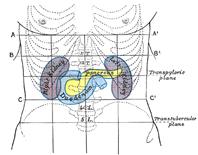The idea that so-called sub-clinical hypothyroidism should not be treated keeps getting questioned by research papers. In this case, those with kidney disease and sub-clinical hypothyroidism seem to do better when treated.
It does make me wonder what the impact of not treating over long periods has? Could it even be a cause of some kidney disease, or at least, deterioration in function?
If your estimated Glomerular Filtration Rate (often abbreviated eGFR in tests) is low, maybe you need to think about this paper?
Thyroid. 2013 Jan 2. [Epub ahead of print]
Thyroid hormone replacement therapy attenuates the decline of renal function in chronic kidney disease patients with subclinical hypothyroidism.
Shin DH, Lee MJ, Lee HS, Oh HJ, Ko KI, Kim CH, Doh FM, Koo HM, Kim HR, Han JH, Park JT, Han SH, Yoo TH, Kang SW.
Source
Kangdong Sacred Heart Hospital, Hallym University College of Medicine , Department of Internal Medicine, 445 Gil-Dong, Kang Dong-Gu, Seoul, Korea, Republic of, 134-701, 82-2-2224-2868; isaac9713@gmail.com.
Abstract
Background:
Subclinical hypothyroidism (SH) is not a rare condition in females, the elderly, or patients with chronic kidney disease (CKD). Even though previous studies have demonstrated that thyroid hormone replacement therapy (THRT) improved cardiac function and dyslipidemia in patients with subclinical hypothyroidism, it remains unclear as to whether THRT can improve renal function in CKD patients with SH. This study investigated the impact of THRT on changes in estimated glomerular filtration rates (eGFR) in this patient population.
Methods:
A total of 113 CKD patients with SH who were treated with L-thyroxine and had eGFR available for at least 24 months before and after THRT were enrolled between January 2005 and December 2011. A linear mixed model was used to compare patients' clinical and biochemical parameters at various time points. The slope of the decline in eGFR over time, both before and after THRT, was also calculated and compared using a linear mixed model.
Results:
The mean age of the study participants was 63.2 ± 12.7 years, and 36 patients (31.9%) were male. The mean follow-up duration before and after THRT was 28.6 ± 4.5 and 30.6 ± 6.4 months, respectively. At 24-months of THRT, TSH levels were significantly reduced [8.86 (0.49) vs. 1.41 (0.73) ?IU/mL, P < 0.001], but there were no significant changes in T3 and fT4 concentrations. Serum albumin, calcium, phosphate, cholesterol, and triglyceride levels were also comparable after THRT. The rates of decline in eGFR were significantly attenuated by THRT [-4.31 (0.51) vs. -1.08 (0.36) mL/min/year/1.73 m2, P < 0.001] even after adjustment for age, gender, diabetes, mean arterial pressure, serum albumin, cholesterol, and triglyceride concentrations (P < 0.001).
Conclusion:
THRT attenuated the rate of decline in renal function in CKD patients with SH, suggesting that THRT may delay reaching end-stage renal disease in these patients.
PMID:
23281965
ncbi.nlm.nih.gov/pubmed/232...
Rod

 But I will be making this a very big point when I next see my GP, along with the fact my ?RA seems to have improved immensely. Hopefully my cholesterol has come down too.
But I will be making this a very big point when I next see my GP, along with the fact my ?RA seems to have improved immensely. Hopefully my cholesterol has come down too. Hopefully things are getting there, slowly but surely.
Hopefully things are getting there, slowly but surely.